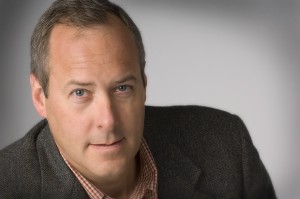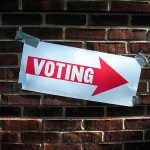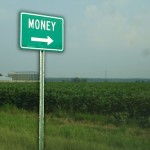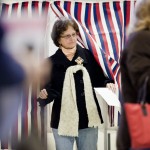Six Ways New Hampshire Voters Think About Jobs And The Economy

University of New Hampshire
Pollster Andy Smith helps StateImpact dig into NH voter psychology after the jump
Given the national atmosphere, it’s difficult to overestimate the importance of each presidential hopeful’s economic blueprints as the New Hampshire primary draws closer. (Our cheat sheet of the GOP candidates’ positions on the economy is available here.)
This year, longtime NH pollster Andy Smith, who directs the University of New Hampshire Survey Center, says it’s far and away the economy that will determine candidates’ vote counts.
That may seem kind of obvious on the surface. But not once you start drilling down into the key questions — the whys and the hows. Why’s Mitt Romney doing so well in New Hampshire (besides the fact he’s got a summer home here)? And how, exactly, is the economy affecting voter perceptions and behavior?
So after reviewing the UNH Survey Center’s recent WMUR Granite State poll, we talked voter psychology with Smith. And that discussion yielded our list of six surprising things about New Hampshire voters and the economy:
- NH voters are still most concerned about jobs and the economy despite the state’s relatively good economic position. More than 60 percent of voters polled by WMUR say the economy and jobs is the most important issue for them in the primary. “This is despite the fact that New Hampshire is actually doing quite well in this economic downturn, compared with other parts of the country,” Smith said. Recently released figures from November show that while the national unemployment rate was 8.6 percent, the Granite State’s jobless rate was only 5.2 percent. New Hampshire also has the lowest poverty rate in the country, and one of the highest median household incomes. But Smith said during presidential elections, New Hampshire voters tend to put their state-centric views aside, and vote based on the big picture.
- Even if the national economy improved, NH voters would STILL say the economy was the top issue.
Consumer confidence is an incredibly important factor in elections, especially when the economy’s been down. But, as Smith explained, “Consumer confidence tends to be a lagging indicator…as we go out of recession. Because folks aren’t really sure that we’re actually out of the woods yet. So they want to hold back on making new purchases or thinking that they can afford a vacation or a new car or something like that until they’re really convinced that the economy has recovered.” In other words, even if the economy recovered, people would still behave–and vote–like we were in a recession. “One of the most famous political slogans that we’ve heard in recent years was the ‘It’s the economy, stupid’ line that the Clinton campaign used against George H.W. Bush back in the 1992 election,” Smith said. “But by the time the election came around in November of 1992, the economy actually was in pretty good shape.”
- To most voters, jobs and the economy are the same issue. Taxes and the deficit are separate matters. Given New Hampshire’s anti-tax leanings, we found this particularly interesting. Remember that more than 60 percent of voters polled by the UNH Survey Center cited “the economy and jobs” as their top issue? This is how Smith explained coming up with that figure. “We asked that as open-ended questions, ‘What’s the most important problem, most important issue for you in the campaign?’ And the kind of responses you get are, ‘Well, the state of the economy and there’s not enough jobs.’…That’s what people will tell us verbatim. So the economy and jobs are so intertwined in the minds of voters that there’s really no way you can separate those two things.” Meanwhile, only about 10 percent of New Hampshire voters told pollsters the budget deficit was their major concern, and three percent mentioned taxes. (You can see a chart of voters’ concerns at the bottom of this post.)
- But to the Republican slate of candidates, jobs, the economy, taxes and the deficit are all the same issue. For the six remaining Republican candidates, tax cuts, spending cuts, and the deficit play major roles in their economic recovery plans. A commenter on our previous post looking at these recovery blueprints wrote: “What about plans to grow the economy ( I see only spending cuts)?” So we asked Smith. “It gets very lost, particularly among the Republicans, who are largely making the argument that the problem that we have with the economy is that the government is trying to do too much about [the economy],” Smith explained. “Their argument is basically, leave things alone, the economy will get better on its own. So coming up with a five point plan to do something about the economy is probably not the kind of thing that a lot of Republicans are going to want you to listen to.” Thus we see a merging of taxes, the deficit, jobs, and the economy in Republican economic recovery plans. “Part of the problem is that it’s very difficult to explain to voters what your economic plan is, and how it is different either from the president’s economic plan, or the economic plans of your Republican rivals,” Smith said. So if all the candidates agree they need to give the economy room to heal itself, they need to differentiate themselves based on which taxes and programs they’ll cut to create that space.
- Mitt’s moderate economic message resonates in part because old school rural Yankee Republicans are a dying breed. The flannel-clad old fashioned New Hampshire conservative is a staple of primary coverage. Recently, UNH political scientist Dante Scala charted the changes in the state’s Republican party over the past 50 years. He found that slowly, the influence of these rural northern Republicans has waned, while southern New Hampshire’s voting power has increased. Scala wrote that over that time, the state “has moved from reliably Republican to Democratic-tilting bellwether.” And that, pollster Andy Smith says, is good news for Mitt Romney. “The reason the state has changed its leanings is largely because those old Republicans died or moved to Florida. And the people that moved in afterwards are far more likely to be Democrats,” Smith said. “And the new voters in the state are, I think, much more in-tune with a guy like Romney than maybe some voters 30, 40 years ago…largely because New Hampshire is essentially a suburb of Greater Boston. Most of the voters live in the southeastern corner of the state, and those kind of voters certainly know who Mitt Romney is, and perhaps share his political philosophies to a greater degree.”
-
Most of NH’s “Independent” voters aren’t that independent at all. Given the flavor of national political coverage over the years regarding the much-vaunted New Hampshire independent voter, we found this little tidbit the most surprising. “[What] we’re seeing in our polling, and this mirrors what we’ve seen historically, somewhere in the 60-62 percent [range] of the Republican primary electorate will be registered Republicans,” Smith said. “Another 20 percent will be people who are registered undeclared, but for all intents and purposes are Republicans…So that leaves only about 20 percent left. And of that last 20 percent, about half of it will actually be Democrats who are registered undeclared but are going to vote in the Republican primary, and the other 10 percent being true independents who are going to vote in the Republican primary.” In other words most independents are spoken for.
Bonus Note: As for why Republicans and Democrats register “Undeclared” in the first place? Smith noted that obscuring personal politics could be beneficial for some jobs, and it allows voters to dodge those annoying political calls. And, perhaps most importantly, only independents are allowed to vote in both Republican and Democratic primaries. “You can still go out and vote on election day, give you something to do,” Smith said. “This year…it’s going to be tens of thousands of people who really aren’t Republicans, but they’re going to vote in the Republican primary, because that’s what you do on primary day in New Hampshire: You go out and vote!”
NH Voters’ Major Concerns
| Jobs/Economy | 63.00% |
| Other | 11.40% |
| Budget Deficit | 10.00% |
| Health Care | 4.00% |
| Immigration | 4.00% |
| Natl. Security/Foreign Policy | 3.00% |
| Taxes | 3.00% |
| Abortion | 2.00% |
| Religious Issues | 0.50% |
| Gun Rights | 0.10% |
University of New Hampshire Survey Center




